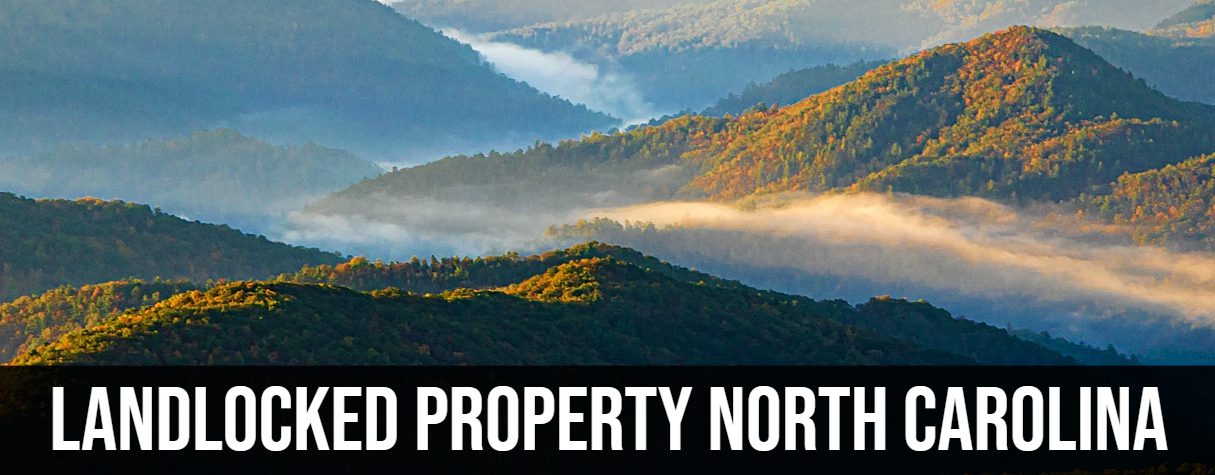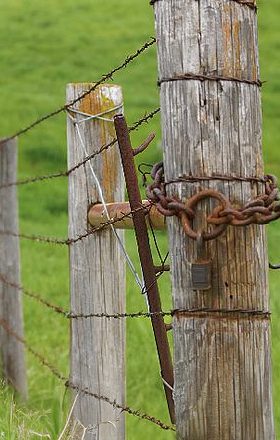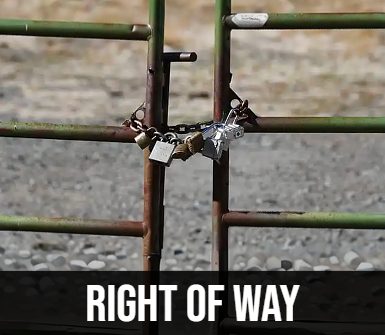
Owning land is a dream for many, but that dream can get a little complicated when your parcel of paradise turns out to be a landlocked property North Carolina. Imagine having a slice of this state’s beautiful terrain but no direct road to get there—it’s like owning a boat without water! While the challenges of landlocked properties might seem daunting, they’re far from insurmountable. Whether you’re dealing with dense woods, hilly landscapes, or simply a lack of access, there are ways to navigate (oops, there’s that word!) these tricky situations. Let’s break down what it means to own landlocked property in North Carolina and explore how you can unlock its true potential.

What Does It Mean to Own Landlocked Property?
In simple terms, a landlocked property is a piece of land that does not have legal access to a public road. You might have the most stunning piece of land nestled in the hills of North Carolina, but without a driveway or a road to it, your enjoyment could be a bit, well, restricted. Whether you inherited this property or bought it without realizing the access issues, dealing with a landlocked property can feel like trying to get to your favorite fishing spot without a boat.
Legal Solutions for Landlocked Property Owners
Fortunately, North Carolina has a few tricks up its sleeve for those landowners looking to gain access to their landlocked treasures. Let’s dive into some of the more common legal solutions:
Easement by Necessity
If your land was carved out of a larger parcel and left without access, you might have a right to an “easement by necessity.” This legal concept allows you to claim access over your neighbor’s land because, well, you gotta get to your property somehow! It’s like borrowing your neighbor’s driveway because your builder forgot to put one in.
Easement by Prescription
Now, if you’ve been sneaking across your neighbor’s land for the past 20 years without them putting up a fuss, you might just have yourself an easement by prescription. It’s kind of like claiming a well-worn footpath that’s been in use since your granddad’s days. Just remember, you need to show that this path has been used openly, continuously, and without permission—like that time you “borrowed” your brother’s car every Saturday night for two decades.
Cartway Proceedings
When all else fails, North Carolina law gives you the right to a cartway proceeding. Think of this as your last-resort, knock-on-the-court’s-door solution to access your land. If your property is used for things like farming or timber (or you’re planning to), you might be able to legally force a road through your neighbor’s land. Of course, you’ll need to pay them for the privilege—because nothing in life is free, not even a dirt path.
Challenges of Obtaining Right of Way
Dealing with a landlocked property is one thing, but getting your neighbors on board can be a whole other ball game. Let’s talk about some of the hurdles you might face.
Negotiating with Neighbors
First, you’ll want to try the friendly route—negotiation. If your neighbors are agreeable, you might be able to work out a deal without involving the courts. Just be ready to bring your charm and maybe some homemade cookies to the bargaining table. If they’re not so agreeable, well, then it’s time to explore other options.
Litigation & Legal Support
When cookies don’t cut it, you might need to bring in the big guns—attorneys. Legal battles over land access can get as heated as a North Carolina summer, but with the right legal support, you can secure the access you need. Just make sure you’ve got a lawyer who knows their way around landlocked property cases because this isn’t something you want to tackle alone.

The Importance of Professional Legal Assistance
Handling landlocked property issues without a seasoned real estate attorney is like trying to drive blindfolded—possible, but not advisable (and definitely not safe!). A good attorney can help you navigate these tricky situations, whether it’s through negotiation, litigation, or cartway proceedings. They can also ensure that you don’t end up in a worse situation than where you started—like getting stuck in a legal quagmire that makes quicksand look friendly.
Common Misconceptions About Landlocked Property

There’s a lot of misinformation about landlocked properties, so let’s clear up a few things. First off, landlocked doesn’t mean worthless. With the right legal steps, that secluded plot can become a valuable asset. Privacy and potential for development make these properties highly desirable once access is secured.
Another misconception is that your neighbor is obligated to give you access just because you ask nicely. Unfortunately, property rights don’t work that way. Without a formal easement or court order, your neighbor has no obligation to grant you access. In many cases, legal action might be necessary to establish your right of way.
Finally, many people believe that obtaining access is a grueling process that’s hardly worth the effort. While it can be challenging, many landowners secure access relatively quickly with the right approach. Remember, landlocked doesn’t mean locked out forever. With the proper legal framework, you can unlock the full potential of your property.
Case Studies: Successful Easement & Right of Way Stories
Let’s dive into a few real-life examples where landlocked property owners in North Carolina have turned the tide in their favor by securing access to their properties through legal avenues. These stories showcase the determination and strategic approaches required to overcome the challenges of landlocked properties.
Easement by Necessity in Buncombe County, NC
In Buncombe County, a landlocked property owner faced a significant hurdle when they realized that their beautiful, wooded parcel had no access to a public road. After discovering that the property was once part of a larger tract, the owner filed for an easement by necessity. The court recognized that when the original land was divided, the remaining parcel was left without access, and thus, an easement was granted. This case highlights how historical land divisions can play a crucial role in establishing access rights.
Prescriptive Easement Success in Wake County, NC
A family in Wake County had been using a narrow dirt road that cut across their neighbor’s land for over 20 years to access their secluded property. The road had been used openly, continuously, and without explicit permission from the neighboring landowner, who never objected. When the neighbor tried to block access, the family filed for a prescriptive easement. The court ruled in their favor, citing the long-term, uninterrupted use of the road as sufficient grounds for the easement. This case exemplifies how long-term use can translate into permanent access rights.
Cartway Proceeding Victory in Jackson County
In Jackson County, a timber company purchased a large tract of landlocked forest with plans to harvest timber. However, without access to the property, their investment was at risk. The company initiated a cartway proceeding, arguing that access was essential for their commercial activities. The court agreed, granting them the right to build a road across adjacent lands, with compensation paid to the affected landowners. This case demonstrates how North Carolina’s cartway laws can be a lifeline for landlocked properties used for commercial purposes.
Negotiated Easement in Mecklenburg County, NC
Not every success story ends in court. In Mecklenburg County, a couple bought a landlocked parcel with dreams of building a weekend getaway cabin. Realizing the access issue, they approached their neighbor with a proposal to purchase an easement. After some negotiation—and a little bit of charm—the neighbors agreed to sell an easement for a fair price. This case underscores the value of diplomacy and negotiation in resolving access issues, often saving time and legal fees.
These case studies demonstrate that while dealing with landlocked property can be challenging, it is by no means a dead end. With the right legal strategy, persistence, and sometimes a bit of creativity, you can secure the access you need to fully enjoy and utilize your North Carolina property. Whether through court proceedings or friendly negotiations, unlocking your land’s potential is within reach.
Conclusion to Landlocked Property North Carolina
So, if you’re sitting on a piece of land that’s more locked up than a treasure chest, it’s time to take action. Whether you’re negotiating with neighbors, preparing for legal action, or simply learning your options, don’t let a lack of access keep you from enjoying your North Carolina property. Get the right help, take the right steps, and soon enough, you’ll be driving right up to your land with ease—maybe even with a smile on your face, knowing you’ve conquered the challenge of landlocked property ownership.
And remember, the process of unlocking your land’s potential not only enhances its value but also opens up endless possibilities for development, enjoyment, or even resale. By turning what might seem like a setback into a success story, you’ll transform that hidden gem of a property into an accessible and prized asset that you and future generations can cherish.
Frequently Asked Questions (FAQs)

1. What Is a Landlocked Property in North Carolina?
A landlocked property in North Carolina is a parcel of land that does not have legal access to a public road. This means the property is surrounded by other parcels with no direct path to the road, making it difficult or impossible to reach without crossing someone else’s land. Such properties can present challenges for development, sale, and use, but they also offer opportunities for privacy and seclusion once access is secured.
2. How Can I Gain Access to a Landlocked Property in NC?
There are several legal avenues to gain access to a landlocked property in North Carolina. You can negotiate with neighboring landowners for an easement, which is a legal right to cross their land. If negotiations fail, you may seek a prescriptive easement if you’ve used the neighbor’s land continuously for 20 years without permission. Another option is to file for a cartway proceeding, which allows the court to grant access for specific uses, such as farming or timber harvesting.
3. What Are My Legal Options for Landlocked Property in NC?
In North Carolina, you have several legal options to gain access to a landlocked property. An easement by necessity may be granted if your property was originally part of a larger tract that was divided, leaving it without access. If you’ve been using a neighbor’s land openly and continuously for 20 years without their permission, you could claim a prescriptive easement. In cases where your property is used for agricultural or industrial purposes, you might pursue a cartway proceeding, which legally grants access through a neighbor’s land for a fair price.
4. Can I Sell a Landlocked Property in North Carolina?
Yes, you can sell a landlocked property in North Carolina, but it may be more challenging due to the access issues. Potential buyers are often concerned about the lack of legal access, which can affect the property’s value. However, if you secure an easement or other legal access before selling, the property can become more attractive to buyers, potentially increasing its market value.
5. What Are the Costs Associated with Resolving Landlocked Properties in NC?
The costs associated with resolving landlocked property issues in North Carolina can vary widely. They may include legal fees for negotiating or litigating easements, surveying costs, and potentially paying neighbors for the right of way. If you pursue a cartway proceeding, there might be additional court costs and compensation required for the land you cross.

Bubba Peek is an experienced real estate investor focused on land acquisition. He holds a Bachelor’s in Finance and a Master’s in Real Estate (MSRE) from the University of Florida, along with the prestigious Certified Commercial Investment Member (CCIM) Designation, held by only six percent of real estate professionals. With over a decade of experience, Bubba blends financial expertise and market insight to deliver outstanding results. As founder of Bubba Land Company, he’s known for offering landowners efficient, hassle-free sales solutions.